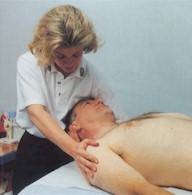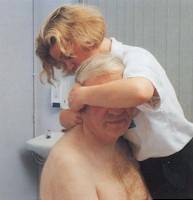Positive Health Online
Your Country

Independent Physiotherapy
listed in physiotherapy, originally published in issue 23 - November 1997
What is physiotherapy?
Physiotherapy is known as the "orthodox alternative" therapy – "orthodox" because it is widely used by the medical profession and "alternative" because physiotherapists utilise a growing number of complementary forms of medicine and treatment methods such as massage, manipulation, acupuncture, reflex therapy, cranio-sacral therapy and therapeutic exercise.
Most of the basic theories and principles which govern these forms of treatment are included as standard practice in physiotherapy and patients can be re-assured that alternative practices are only used by Chartered Physiotherapists if they have been proved to be beneficial and will help that particular patient
Physiotherapy was established as an independent profession over 100 years ago and is the only Chartered physical therapy amongst the growing number of alternative therapies. It is recognised by doctors as a major contributor to health care and an accepted supplement to medicine and surgery.
Chartered physiotherapists will carefully analyse problems taking an holistic approach which ensures that they understand how each separate problem impacts on the whole person's lifestyle at work and at leisure. They will then not only treat the problem but, perhaps even more importantly, will spend time with the patient advising them how to stop the problem from recurring. Patients with long term problems such as stroke or multiple sclerosis receive advice on how to manage their problem and maintain maximum independence.
Every day for the independent Chartered physiotherapist is different and each patient may need help with any one of the comparatively common complaints or combinations of complaints shown in Table 1.
Table 1: Common complaints treated by physiotherapists
SPINAL – including prolapsed discs, degeneration, sciatica, lumbago, stiff / painful neck and referred arm and leg pains.
JOINT – arthritis, injury, pain / swelling/ stiffness in joints such as shoulders, elbows, wrists, hips, knees and ankles.
INJURIES – to muscles, ligament, cartilage and tendon problems. Work related conditions such as Repetitive Strain Injury (RSI).
AFTER SURGERY – rehabilitation after orthopaedic surgery e.g. hip and knee replacements or general physiotherapy after general surgery.
FRACTURES – treatment to increase the healing rate and to gain full function once the bones have healed.
ABDOMINAL – such as spastic colon, colitis and irritable bowel syndrome.
GYNAECOLOGICAL – including stress incontinence, salpingitis and post surgery rehabilitation.
OBSTETRICS – including ante and post-natal classes/ exercise/ relaxation / advice and treatment for back pain during pregnancy.
CHEST – both medical and surgical, including hayfever, asthma and sinusitis, pneumonia, cystic fibrosis, emphysema, bronchitis, bronchiectasis and hyperventilation.
NEUROLOGICAL – such as strokes, head injuries, nerve injuries, multiple sclerosis, shingles, cerebral palsy and ME.
PAEDIATRICS – for childhood conditions including postural and walking problems.
CIRCULATORY – such as Raynauds disease, wounds, ulcers, cardiac rehabilitation.
An holistic approach ensures that an overall assessment is undertaken and all problems are addressed where possible during treatment.
Why should you see an Independent Physiotherapist?
A number of reasons, the following genuine case studies highlight the reasons why more and more people seek help out their Independent Physiotherapist.
Early treatment frequently means a quicker recovery with less time off work or less time in acute pain. Independent physio- therapists work in your community. There are over 2700 in the UK and they pride themselves in seeing patients at the earliest opportunity at a time that will fit in with the patient's lifestyle, perhaps 7.00 in the morning before the patient goes to work or 8.00 at night when they return after a day's work.
Although the physiotherapist works closely with the GP, and will keep them advised of treatment undertaken, there is no need for a patient to see the GP first. Most patients simply contact the physiotherapist directly.


Case study
Roy is a self-employed builder whose hobby is fishing. His income is dependent on personal recommendations and the ability to fulfil his contracts on time. His work involves heavy lifting and with business under pressure, he cannot afford to be off work. Roy is used to a degree of back pain as a consequence of his work but it was with horror that he lifted some heavy planks of wood one day and experienced very acute pain in his low back which left him almost unable to move. He managed to get home and hoped that with a night's rest he would be better. In the morning, however, he was worse, with shooting pains down the back of his left leg. Being a tough man – he, of course, tried to get up and go to work thinking he would "work it off".
He soon realised that trying to move was making the pain much worse and he had to lie down again. His wife made direct contact with the local Independent Physiotherapist who offered immediate advice over the telephone on how to move correctly to minimise the pain.
The pain was so acute that Roy was unable to get out of bed so the therapist made a home visit to assess the situation rather than risk making the problem worse by asking Roy to get into a car and come to her clinic.
Examination identified the nature of his problem – pain caused by a bulging disc in his lower back which was pressing on the spinal cord; she administered fast effective treatment which eased the pain. She explained his condition and taught him how to move and undertake specific therapeutic exercise every hour to reduce the bulge of the disc.
The following day he was considerably better, but although the pain was easier, it was easily aggravated. He attended the clinic for further treatment for the next two days after which he was able to return to work in a supervisory role at the building site and returned fully to his work within ten days.
During treatment he was taught how his back worked and how his work produced the stresses which caused the disc to bulge.
Roy was also taught how his hobby of fishing which involved sitting and often leaning forward for hours at a time was contributing to the stresses in his back. He was taught to stand and stretch frequently while fishing thereby altering his position to alleviate the pressures of sitting from the discs in his back.
He was given a programme of exercises to undertake which would ensure that his back remained strong and flexible and advice on lifting to ensure that he did not have a recurrence of the problem.
Fast effective treatment and advice ensured that Roy was back at work as soon as possible and that he understood how to manage the stresses of his work and hobby in order to prevent a recurrence. It minimised his loss of income and gave him the knowledge and confidence to control the stresses on his back.
Case study
James, now 10 years old, had been given a course of antibiotics for a minor ear infection when he was just six months old. The ear infection eventually cleared, but he developed asthma. There was no history of chest problems prior to this, and he was generally a fit and healthy baby. The delivery had been normal and there was no history of asthma in the family.
Medication had included Ventolin and Becotide since the onset of the asthma, and his situation had not changed. When he was 5 year old a course of steroids was suggested as the next course of action, which the parents were unhappy with.
They decided to seek advice from their local Independent Physiotherapist who looked for the underlying reason as to why James developed asthma in the first place rather than just treating the symptoms and offering palliative care. The physiotherapist recommended Interferential (low frequency current treatment) Therapy within a complete physiotherapy regime.
James had poor chest expansion with shallow apical breathing so the treatment aims were to teach management of the asthma and, using long-established respiratory physiotherapy techniques, to improve his chest expansion generally. They also included a course of Interferential Therapy.
Over a period of six weeks, five treatments were given. At the same time his medication was reduced and stopped completely after the third treatment session.
On the last treatment day, he stood in the middle of a hay field whilst it was being cut and only suffered a slightly runny nose.
James has now been nearly 5 years without medication and has shown no further signs or symptoms of asthma.
To summarise then, seven sound reasons why you should see an independent physiotherapist:
• specialist expertise
• speed of service
• convenience
• flexibility
• an holistic approach to the problem
• individual attention and treatment
• education and advice
Reference
All Chartered Physiotherapists are highly trained professionals. They follow three or four year courses of study after "A" level or First Degree studies which entitles them to use the letters MCSP (Member of the Chartered Society of Physiotherapy) and SRP (State Registered Physiotherapist) after their names.
You can find the name of your local independent Chartered Physiotherapist in the Yellow Pages, (physiotherapists section) in a block advertisement under PhysioFirst or in the PhysioFirst Membership Directory in your local library or by telephoning 01702 392124
The average cost of a 30 – 45 minute appointment with an independent physiotherapist is between £20 and £35 depending on the location of the practice and areas of specialisation.
Comments:
-
No Article Comments available